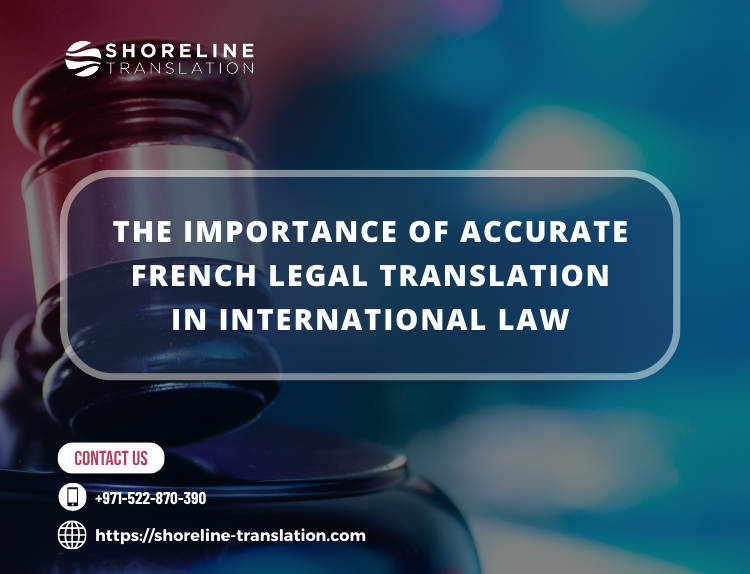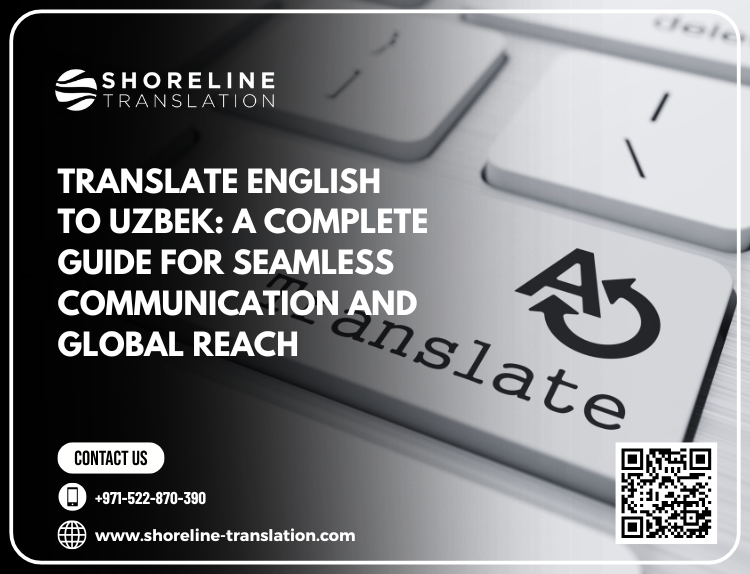Table of Contents
ToggleThe Importance of Accurate French Legal Translation in International Law
Welcome to our blog post on the importance of accurate French legal translation in international law! In today’s globalized world, where legal proceedings and contracts frequently cross borders, it is essential to ensure that language barriers do not hinder successful communication. This is particularly true when it comes to translating legal documents and materials from French into other languages or vice versa
French legal translation involves much more than simply converting words from one language to another. It requires a deep understanding of both the French language and the intricacies of the legal system. A minor mistake or misinterpretation can have significant consequences, potentially affecting court cases, business transactions, and even personal rights.
In this article, we will delve into why accurate French legal translation is vital in international law. We will explore the challenges faced by translators in accurately conveying meaning across different legal systems and highlight how inaccurate translations can impact important proceedings and agreements. Additionally, we’ll provide tips for finding skilled French legal translators who can navigate these complexities with precision.
So let’s dive in deeper as we unravel the significance of precise translations in navigating the complex landscape of international law!

What is French Legal Translation?
French legal translation refers to the process of converting legal texts or documents from French into another language, or vice versa. It involves translating complex terminology and concepts related to various areas of law, such as civil law, criminal law, corporate law, intellectual property law, and more.
Legal translation requires specialized knowledge and expertise in both language and law. Translators must possess a comprehensive understanding of legal systems in both the source and target languages to accurately convey meaning while preserving legal nuances. They need to be familiar with specific terminologies used in each jurisdiction.
Accuracy is paramount when it comes to French legal translation. Even minor errors can lead to misinterpretations that may have far-reaching consequences in courtrooms or contractual agreements. This highlights the importance of using professional translators who are well-versed in both languages’ legalese.
Moreover, French legal translation goes beyond mere linguistic proficiency. It requires an understanding of cultural differences between countries where French is spoken and those where it isn’t. A skilled translator must navigate these cultural intricacies while ensuring accurate translations that respect local customs and norms.
In short, French legal translation demands expert linguists who possess deep knowledge not only of language but also of the complexities of different legal systems. Their role is crucial in bridging linguistic gaps to facilitate effective communication within international legal contexts.
The importance of accurate legal translation in international law
The importance of accurate legal translation in international law cannot be overstated. In a globalized world, where cross-border transactions and collaborations are the norm, precise communication is crucial. Here are five reasons why accurate legal translation is essential:
1. Clarity and Comprehension: Legal documents contain complex terminology and principles that must be accurately translated to ensure clarity and comprehension among all parties involved.
2. Compliance with International Standards: International laws often require legal documents to be translated into multiple languages. Accurate translations help organizations comply with these standards and avoid potential legal complications.
3. Preserving Intent and Meaning: The accuracy of legal translations ensures that the intent, meaning, and nuances of original texts remain intact across different languages, preventing misinterpretations or misunderstandings.
4. Enhancing Trust and Professionalism: Accurate translations demonstrate professionalism, attention to detail, and respect for cultural differences – qualities important in building trust between parties from different countries.
5. Avoiding Costly Errors: Inaccurate translations can lead to costly errors such as breaches of contract or regulatory violations. Investing in accurate legal translation mitigates these risks by ensuring error-free documentation.
Accurate legal translation is vital for clear communication, compliance with international standards, preservation of intent, enhancing trustworthiness, and avoiding expensive mistakes in international law-related matters.
Understanding the French language in legal contexts
Understanding the French language in legal contexts is crucial for accurate translation and interpretation. Here are five key points to consider:
1. Legal Terminology: The French legal system has its specific terminology, which may differ from common everyday French vocabulary. Translators must possess a deep understanding of these specialized terms to accurately convey legal concepts.
2. Civil Law System: France follows a civil law system, which differs significantly from the common law system used in English-speaking countries. This means that legal principles, procedures, and concepts may vary between the two systems, requiring translators to know both.
3. Code Napoleon: The French legal system is based on the Code Napoleon (Civil Code), which provides comprehensive laws on various aspects such as contracts, property rights, family law, and more. Translators must be well-versed in this code to ensure accurate translations.
4. Cultural Context: Language is deeply embedded within culture, so translators need to understand cultural nuances when translating legal documents. Familiarity with French customs and practices can help avoid misunderstandings or misinterpretations that could impact legal proceedings.
5. Precision & Formality: Legal texts demand precision and formality regardless of the language used. In French legal translation, attention should be given to preserving this formal tone while ensuring accuracy in conveying complex ideas without ambiguity or confusion.
By understanding these important aspects of the French language in a legal context, skilled translators can provide accurate translations that maintain clarity and uphold the integrity of international law agreements.
Challenges of translating legal documents accurately
1. Language and Terminology: Translating legal documents requires a deep understanding of both the source language (usually French) and the target language. Legal terminology can vary greatly between languages, and translators must be well-versed in the specific terminology used in international law.
2. Cultural Differences: Legal systems not only differ from country to country but also within different regions within a country. Translators must navigate these cultural nuances to ensure that they accurately convey the intended meaning of the original document while taking into account any cultural sensitivities or differences.
3. Ambiguity and Vagueness: Legal texts can often be complex, filled with intricate clauses, subclauses, and technical jargon. Add to this the potential for vague or ambiguous wording, which may require careful interpretation by translators to capture its precise meaning without altering its intent.
4. Confidentiality: Accurate translation of legal documents demands utmost confidentiality due to their sensitive nature. Professionals need strict protocols in place when handling such materials to protect client information while ensuring accurate translations are delivered securely.
5. Quality Control Measures: Achieving accuracy in legal translation requires rigorous quality control measures during every step of the translation process. This includes proofreading by native speakers skilled in both languages involved, as well as reviewing drafts against original text for consistency and accuracy.
Translating legal documents precisely is an exacting task that demands expertise beyond just linguistic skills – it necessitates a comprehensive knowledge of international law concepts along with sharp attention to detail.
By overcoming these challenges through experienced professionals who specialize in French legal translation services like Shoreline Translation, you can ensure accurate translations that uphold the integrity and precision necessary for successful cross-border communication.
The impact of inaccurate translations on legal proceedings and contracts
The impact of inaccurate translations on legal proceedings and contracts can be significant. Here are five key points to consider:
1. Misinterpretation of terms: Inaccurate translations can lead to misinterpretation of important legal terms, resulting in confusion or potential misrepresentation of the intended meaning in a contract or legal document.
2. Legal consequences: Mistakes in translation may have serious legal implications, leading to disputes, delays, or even the nullification of contracts. It is crucial that translations accurately convey the original intent and wording.
3. Compliance issues: International law requires accurate translations for compliance purposes. If a translation fails to meet these requirements, it could lead to non-compliance with local regulations or international standards.
4. Reputation damage: Inaccurate translations reflect poorly on individuals or businesses involved in legal proceedings or contractual agreements. This can harm their reputation and undermine trust among clients, partners, and stakeholders.
5. Financial losses: Incorrectly translated documents may result in financial losses due to failed partnerships, invalidated contracts, court fees from litigation caused by misunderstandings, or missed business opportunities arising from language barriers.
Accurate French legal translation plays a vital role in preserving the integrity of legal processes and protecting the interests of all parties involved in international law matters.
Tips for finding a skilled French legal translator
1. Seek native speakers: When searching for a skilled French legal translator, prioritize native speakers who have an in-depth understanding of the language’s nuances and cultural context. Native translators can ensure accurate translations that capture the essence of legal terminology.
2. Look for specialization: Ensure that the chosen translator specializes in legal translation, particularly within international law and French-speaking jurisdictions. Legal documents require precision, so it’s crucial to find someone with expertise in this specific field.
3. Verify qualifications and certifications: Check if the translator holds relevant qualifications or certifications from reputable institutions or professional organizations such as the American Translators Association (ATA) or Chartered Institute of Linguists (CIOL). These credentials demonstrate their commitment to maintaining high standards.
4. Assess experience: Consider the translator’s previous experience working on similar projects involving French legal translation. Request samples or references to evaluate their accuracy, attention to detail, and ability to meet deadlines consistently.
5. Communication skills matter: Effective communication is essential when collaborating with a translator throughout your project. Look for someone responsive, understands your objectives clearly, and can provide regular updates on progress while addressing any questions or concerns promptly.
Finding a skilled French legal translator requires careful consideration of various factors such as language proficiency, specialization, qualifications/certifications, experience levels, and effective communication skills.
Shoreline Translation Offers French Legal Translation Services
When it comes to accurate and reliable French legal translation services, look no further than Shoreline Translation. With their team of expert translators who specialize in the complexities of legal language, they are your go-to resource for all your international law needs.
At Shoreline Translation, they understand the importance of precision when it comes to translating legal documents. They have a deep understanding of both the French language and the intricacies of legal contexts. This ensures that every word and nuance is accurately conveyed in each translated document.
With years of experience in the industry, Shoreline Translation has encountered various challenges that arise during legal translations. From complex terminology to cultural nuances, their skilled translators navigate these hurdles with ease. They have developed strategies to ensure accuracy while maintaining the integrity and intent behind each document.
Inaccurate translations can have severe consequences in legal proceedings and contracts. That’s why choosing a reputable translation service like Shoreline is crucial. Their meticulous approach minimizes any potential errors or misinterpretations that could jeopardize important agreements or cases.
Finding a skilled French legal translator can be daunting, but with Shoreline Translation, you can rest assured knowing you’re working with professionals who prioritize accuracy and quality above all else. They carefully select their translators based on expertise and subject knowledge, ensuring that your specific needs are met with precision.
Don’t take risks when it comes to your international law requirements. Trust Shoreline Translation for all your French legal translation needs – because accuracy matters!
FAQs
1. What is French Legal Translation?
French legal translation refers to the process of accurately translating legal documents, contracts, and proceedings from French into another language or vice versa. It requires a deep understanding of both the French language and legal terminology.
2. Why is accurate legal translation important in international law?
Accurate legal translation is crucial in international law for several reasons. First, it ensures that all parties involved can fully understand the terms and conditions of agreements or contracts. Second, it helps prevent misinterpretations and misunderstandings that could lead to disputes or litigation. Third, accurate translations uphold the integrity of legal systems across different jurisdictions.
3. How can inaccurate translations impact legal proceedings and contracts?
Inaccurate translations can have severe consequences in legal proceedings and contracts. They may result in confusion, ambiguity, or incorrect interpretations of important clauses or provisions. This can lead to costly disputes, delays in court proceedings, loss of credibility for involved parties, and even invalidated agreements.
4. How do I find a skilled French legal translator?
Finding a skilled French legal translator requires careful consideration. Look for translators with expertise in both languages as well as experience specifically related to legal matters such as contract drafting or courtroom interpreting. Seek recommendations from trusted sources or consider working with reputable translation agencies like Shoreline Translation that specialize in providing high-quality language services.
Conclusion
In today’s globalized world, accurate French legal translation plays a crucial role in international law. Whether it is translating legal documents, contracts, or court proceedings, the importance of precise and reliable translations cannot be overstated.
With the complexities of the French language and its specific legal terminology, finding a skilled translator who understands both linguistic nuances and legal concepts is essential. The consequences of inaccurate translations can have far-reaching effects on legal proceedings, contracts, negotiations, and ultimately justice itself.
Shoreline Translation recognizes the significance of accurate French legal translation and offers specialized services to meet your needs. Our team of experienced translators combines their linguistic expertise with an in-depth understanding of international law to ensure high-quality translations that are faithful to both content and context.
So when it comes to navigating through the intricacies of French legal documents in an international setting, trust Shoreline Translation for precise and reliable results. Contact us today for all your French legal translation needs!





